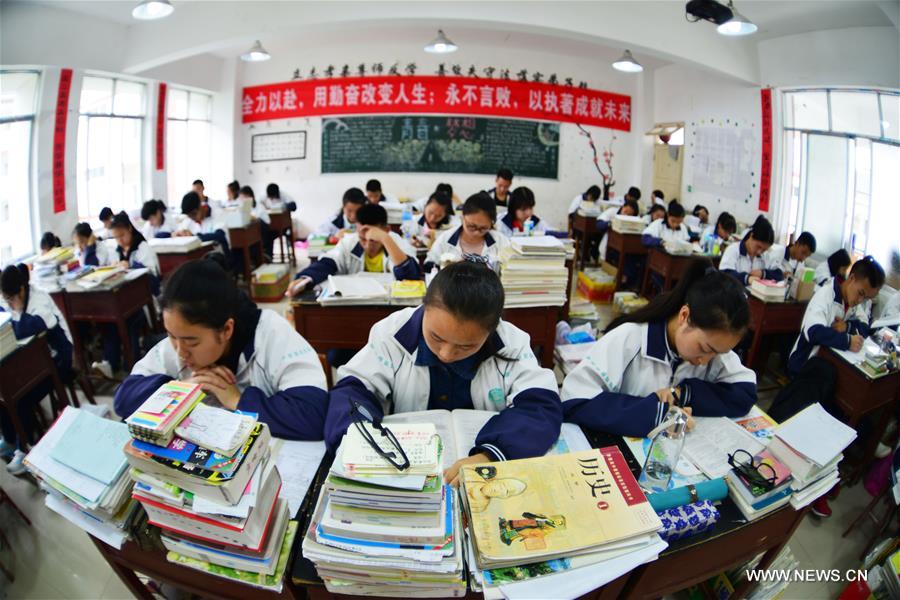CHINA Tries to Redistribute Education to the Poor, Igniting Class Conflict
- "China Tries to Redistribute Education to the Poor, Igniting Class Conflict", The New York Times, June 12, 2016.
BEIJING — Cheng Nan has spent years trying to ensure that her 16-year-old daughter gets into a college near their home in Nanjing, an affluent city in eastern China. She wakes her at 5:30 a.m. to study math and Chinese poetry and packs her schedule so tightly that she has only 20 days of summer vacation. So when officials announced a plan to admit more students from impoverished regions and fewer from Nanjing to local universities, Ms. Cheng was furious. She joined more than 1,000 parents to protest outside government offices, chanting slogans like “Fairness in education!” and demanding a meeting with the provincial governor.
“Why should they eat from our bowls?” Ms. Cheng, 46, an art editor at a newspaper, said in an interview. “We are just as hard-working as other families.”
Parents in at least two dozen Chinese cities have taken to the streets in recent weeks to denounce a government effort to expand access to higher education for students from less developed regions. The unusually fierce backlash is testing the Communist Party’s ability to manage class conflict, as well as the political acumen of its leader, Xi Jinping. The nation’s cutthroat university admissions process has long been a source of anxiety and acrimony. But the breadth and intensity of the demonstrations, many of them organized on social media, appear to have taken the authorities by surprise.

- High School Students in SW China's Guizhou's Province Study for College Entrance Examination in Early June -
At issue is China’s state-run system of higher education, in which top schools are concentrated in big prosperous cities, mostly on the coast, and weaker, underfunded schools dominate the nation’s interior. Placement is determined almost exclusively by a single national exam, the gaokao, which was administered across China starting on Tuesday.
The test is considered so important to one’s fate that many parents begin preparing their children for it before kindergarten. The government has threatened to imprison cheaters for up to seven years.
The exam gives the admissions system a meritocratic sheen, but the government also reserves most spaces in universities for students in the same city or province, in effect making it harder for applicants from the hinterlands to get into the nation’s best schools.
The authorities have sought to address the problem in recent years by admitting more students from underrepresented regions to the top colleges. Some provinces also award extra points on the test to students representing ethnic minorities. This spring, the Ministry of Education announced that it would set aside a record 140,000 spaces — about 6.5 percent of spots in the top schools — for students from less developed provinces. But the ministry said it would force the schools to admit fewer local students to make room.
Against the backdrop of slowing economic growth, the plan set off a flurry of protests and counterprotests. In Wuhan, a major city in central China known for its good universities, parents surrounded government offices to demand more spots for local students. In Harbin, a northeastern city, parents marched through the streets, calling the new admissions mandate unjust.
But in Luoyang, a city in Henan Province, one of China’s poorest and most populous, protesters countered that children should be treated with “equal love.” And in Baoding, a few hours’ drive southwest of Beijing, parents accused the government of coddling the urban elite at the expense of rural students. “When they need water, land and crops, they come and take it,” said Lu Jian, 42, an electrician who participated in the protests in Baoding. “But they won’t let our kids study in Beijing.” The government has responded cautiously, censoring news reports of the outcry and ordering the police to contain the demonstrations.
“The traditional Chinese dream is the hope of advancement for children through a relatively open, meritocratic and egalitarian system,” said Carl F. Minzner, a professor of law at Fordham University and an expert on Chinese government. “Popular outrage is triggered when there’s a perception that this is being challenged.”
Mr. Xi has argued that high levels of inequality in China could shake the party’s hold on power, and his government has sought to ease frustration in poorer areas by investing in education, health care and social services. But party leaders are also wary of alienating a growing and increasingly outspoken urban middle class.
“The question is how far are they willing to go in reallocating the privileges enjoyed by established urbanites, many of them state employees,” Professor Minzner said. Over the past two decades, the government has opened hundreds of new institutions of higher education, and university enrollment surged to 26.2 million in 2015 from 3.4 million in 1998, though much of the growth has been in three-year polytechnic programs. At the same time, job prospects for college graduates in China have dimmed in recent years. That has left parents worried about wasting their life savings on substandard schools and even more desperate to get their children into the better ones...Con't.
Read more, http://www.msn.com/en-us/news/world/china-tries-to-redistribute-education-to-the-poor-igniting-class-conflict/ar-AAgVaTd?ocid=spartandhp
seabeckind
(1,957 posts)No way we should allow that in this country.
:sarcasm
We should ensure that only the gentry have a road to education.
appalachiablue
(41,103 posts)and secure, beneficial jobs. The way it is, limits you know and as Greenspan said, 'greater worker insecurity' is healthier and makes society so much better. For affluent elites.
![]()
